|
|
|
Sort Order |
|
|
|
Items / Page
|
|
|
|
|
|
|
| Srl | Item |
| 1 |
ID:
143474


|
|
|
|
|
| Publication |
Massachusetts, Center for International Studies, 1980.
|
| Description |
67p.pbk
|
|
|
|
|
|
|
|
|
|
|
|
Copies: C:1/I:0,R:0,Q:0
Circulation
| Accession# | Call# | Current Location | Status | Policy | Location |
| 023133 | 330.95195/GRI 023133 | Main | On Shelf | General | |
|
|
|
|
| 2 |
ID:
133161
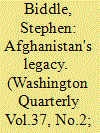

|
|
|
|
|
| Publication |
2014.
|
| Summary/Abstract |
The war in Afghanistan is not over. Nor is it ending any time soon. The U.S. role may end in 2016, in whole or in part, but the war will continue-and its ultimate outcome is very much in doubt. The conflict is now stalemated militarily, and will likely stay that way as long as outsiders pay the large bills needed to keep the Afghan National Security Forces (ANSF) in the field and fighting. The war will thus grind onward until this funding dries up or the two sides negotiate a compromise settlement, neither of which is imminent. Depending on how any talks unfold, historians in 2050 could thus look back on this war as a costly but tolerable outcome for the West, as a wasteful disaster, or as something in between; for now, all we know for sure is that it continues.
|
|
|
|
|
|
|
|
|
|
|
|
|
|
|
|
| 3 |
ID:
125905
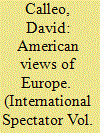

|
|
|
|
|
| Publication |
2013.
|
| Summary/Abstract |
America's diplomacy towards Europe has passed through two broad historic phases. A first, isolationist phase, determined in part by America's need to maintain its domestic multinational consensus, was replaced, after World War II and under the Soviet threat, by a policy of hegemonic engagement. The Soviet collapse opened a new era forcing a reinterpretation of America's role in Europe and the world. Four different narratives have emerged: triumphalist, declinist, chaotic or pluralist. If a unipolar American role seems unlikely to persist, American decline is all too possible. A new hegemonic replacement seems unlikely, which makes the pluralist narrative plausible and desirable. This multipolar world will require an adaptation of the Western alliance and a new way of thinking about interstate relations. Confederal Europe, for its experience in bargaining and conciliation, might have much to offer to the new plural world order.
|
|
|
|
|
|
|
|
|
|
|
|
|
|
|
|
| 4 |
ID:
133377
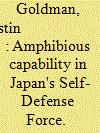

|
|
|
|
|
| Publication |
2014.
|
| Summary/Abstract |
Today the Japanese face an increasingly complex regional-security environment, particularly along the southwestern islands, where incursions by Chinese government vessels are increasingly occurring in what Japan claims as its territorial waters. The security of offshore islands has developed as an area of focus within Japanese defense planning, and Japan has begun building up modest island-defense capabilities.1 Although the nature and range of threats faced have evolved, a core focus of the Japan Self-Defense Force (JSDF ) remains the same- the requirement to protect the nation from an amphibious invasion.2 While the JSDF has developed some robust platforms, its current state also reflects the constraints placed on its development under the 1947 constitution, enacted during the occupation following World War II. …
|
|
|
|
|
|
|
|
|
|
|
|
|
|
|
|
| 5 |
ID:
130606
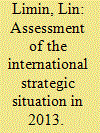

|
|
|
|
|
| Publication |
2014.
|
| Summary/Abstract |
The international strategic situation in 2013 appeared very calm than ever before and had no outstanding features; the fact of its having no special feature was its de?ning characteristic. Although 2013 could be
characterized as a normal year, the international strategic situation has undergone some profound changes. One of the most important is that the United States may have quietly given up its role of the "world police." The 'post-American era' has begun to arrive without attracting much attention in the international community. Many of these profound changes, including the long-term downturn of the world economy, the ongoing process of the West 's decline and the rise of the East, the endless chaos in the Middle East, readjustments in the international order and great power relations, and the evolving relationship between China and the U.S. are all closely related with this dawning of the 'post-American era.' Thus, the 2013
international strategic situation could be seen as holding the seeds of greater change than has been seen since the collapse of the Soviet Union in 1991.
|
|
|
|
|
|
|
|
|
|
|
|
|
|
|
|
| 6 |
ID:
133666
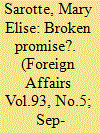

|
|
|
|
|
| Publication |
2014.
|
| Summary/Abstract |
Moscow has long argued that in expanding NATO eastward, Washington broke the promise it made to Soviet leaders shortly after the Berlin wall fell. But new evidence shows that the United States never actually made such a pledge.
|
|
|
|
|
|
|
|
|
|
|
|
|
|
|
|
| 7 |
ID:
133802
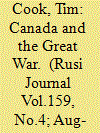

|
|
|
|
|
| Publication |
2014.
|
| Summary/Abstract |
Britain's war effort was crucially aided by its Dominions, with Canada's experience of the First World War a prime example of this fundamental military contribution
Canada's contribution to the war effort on the Western Front was of fundamental importance throughout the Great War. Tim Cook traces how, over four years, what started as a little-organised contingent of 31,000 troops of mostly citizen-soldiers grew into an effective fighting force that made significant contributions to the final victory over the Central Powers.
|
|
|
|
|
|
|
|
|
|
|
|
|
|
|
|
| 8 |
ID:
133853
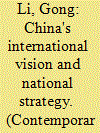

|
|
|
|
|
| Publication |
2014.
|
| Summary/Abstract |
The global order was set in place following the end of the Second World War by a consortium of western countries headed by the U. S. since then, major western countries have strived to maintain their long dominance in global politics and economics. With the rise of nationalist movements, former colonies gained their independence, and many developing countries joined the UN in recent years the economies of the emerging powers have grow rapidly and they have also joined WTO.
|
|
|
|
|
|
|
|
|
|
|
|
|
|
|
|
| 9 |
ID:
133586
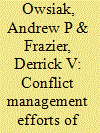

|
|
|
|
|
| Publication |
2014.
|
| Summary/Abstract |
Motivations for conflict management are rarely discussed in terms of commitments that potential third-parties have toward one or both disputants. The current study addresses this lacuna by examining how alliance designs affect conflict management behavior. Specifically, we argue that third-party states' willingness to manage interstate conflicts depends on both the existence and depth of an alliance relationship. We test this argument using data on conflict management within militarized interstate disputes during the period 1946-2000. We find that allies are more likely than non-allies to manage their partner's disputes. Underneath this aggregate relationship, however, we also find that the depth of alliance commitments strongly influences this behavior. Deeper commitments - both across and within alliance types - increase the likelihood of conflict management significantly
|
|
|
|
|
|
|
|
|
|
|
|
|
|
|
|
| 10 |
ID:
181686
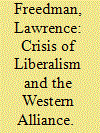

|
|
|
|
|
| Summary/Abstract |
Liberalism as the ideology of the Western alliance is in crisis. Having seen off Nazism and communism, it gained influence after the end of the Cold War, which produced optimism about security, human rights and global prosperity. Now liberalism, shaken by the financial crisis and the wars in Afghanistan and Iraq, is in retreat. Illiberal states, notably China and Russia, are reshaping the international system. Liberalism may not be able to continue to bind allies together, or enable them to cooperate effectively in a severe crisis. There are three counters to a gloomy prognosis, however. Firstly, heightened great-power competition has reinforced rather than undermined the alliance. Secondly, Russia and China have no substantial alliances, and are showing that authoritarian governments face serious problems of their own, including entrenched leaderships. Thirdly, liberalism remains better equipped to adapt to new circumstances.
|
|
|
|
|
|
|
|
|
|
|
|
|
|
|
|
| 11 |
ID:
131639
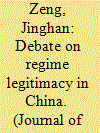

|
|
|
|
|
| Publication |
2014.
|
| Summary/Abstract |
This article identifies continuities, new trends and shifts in emphasis in the Chinese elite debate about political legitimacy by analysing 125 Chinese articles concerning legitimacy published between 2008 and 2012. It reveals a remarkable cleavage between the international perceptions of the Chinese state and the pessimistic views among Chinese intellectuals about the party's ruling. It finds that Chinese scholars often look at Western theories when dealing with the legitimacy conundrum, and rarely look at Chinese philosophy. They focus on ideology much more than Western scholars, and they are more pessimistic about performance legitimacy than the latter. Moreover, this study finds that the legitimacy concerns and policy suggestions of scholars vary significantly depending upon their research locations, institutions and funding sources. This study also finds a distinct rising appeal of social autonomy that runs counter to the dominant official line. Nowadays, value changes, socioeconomic inequality and corruption are considered to be the most perceived threats to legitimacy; ideology, social justice and governance are the leading prescriptions for the party-state. This result is vastly different from the previous study, suggesting a fundamental shift in the legitimacy debate driven by the worsening socioeconomic problems in China.
|
|
|
|
|
|
|
|
|
|
|
|
|
|
|
|
| 12 |
ID:
143453
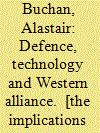

|
|
|
|
|
| Publication |
London, Institute for Strategic Studies, 1967.
|
| Description |
20p.pbk
|
| Series |
no, 6
|
|
|
|
|
|
|
|
|
|
|
|
Copies: C:1/I:0,R:0,Q:0
Circulation
| Accession# | Call# | Current Location | Status | Policy | Location |
| 003745 | 355.404/BUC 003745 | Main | On Shelf | General | |
|
|
|
|
| 13 |
ID:
134042
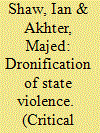

|
|
|
|
|
| Publication |
2014.
|
| Summary/Abstract |
This article explores the shifting methods of U.S. state violence. Building on their earlier work, the authors focus on the use of drones for targeted killings in Pakistan, but here they tease out the wider implications for the future of "warfare"-particularly the meaning and extent of sovereignty and territory. The authors argue that drone strikes both emerge from and feed back into a series of evolutions in the nature of state violence, centered on the intensely bureaucratic and automated delivery of death. This technopolitical transformation, they contend, is underwritten by the abandonment of "thought" and the ascendance of what Hannah Arendt calls an unaccountable "rule by nobody." To build this argument, the authors investigate the institutional conditions of modern-day drone strikes, moving historically and geographically to the birth of the Predator drone and the rise of the CIA in 1980s Afghanistan. By studying nonhuman sources of power, the authors argue that today's planetary manhunt exceeds any direct human control. They conclude by exploring the "individualization" of targeting and its likely consequences for war and law enforcement.
|
|
|
|
|
|
|
|
|
|
|
|
|
|
|
|
| 14 |
ID:
133803
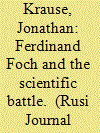

|
|
|
|
|
| Publication |
2014.
|
| Summary/Abstract |
Ferdinand Foch's thinking on trench warfare adapted as the war wore on, making an influential if under-researched contribution to tactical and operational doctrine
Ferdinand Foch, Supreme Allied Commander of the armies that defeated the Central Powers, made a significant contribution to the development of the doctrine of trench warfare throughout the First World War. Yet his name is barely remembered in British popular discourses about the conflict. Jonathan Krause analyses how Foch\'s tactical and operational thinking developed in the crucial period of 1915-16.\r\n
|
|
|
|
|
|
|
|
|
|
|
|
|
|
|
|
| 15 |
ID:
134008
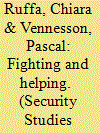

|
|
|
|
|
| Publication |
2014.
|
| Summary/Abstract |
In complex humanitarian emergencies, why are NGO-military relations cooperative in some cases, yet deeply conflictual in others? Drawing on historical-institutionalist theoretical insights, we argue that NGOs and military organizations are embedded in, and responding to, domestic institutional configurations that define a set of political incentives and constraints, material and normative, which structures and influences the characteristics and outcomes of their relations. Counterarguments suggest that organizational differences and the nature of their missions affect NGO-military relations. Using fresh empirical evidence we assess these arguments by comparing the Italian and the French experiences of NGO-military relations during the NATO-led International Security Assistance Force (ISAF) mission in Afghanistan and the UN mission in Lebanon (UNIFIL II) between 2007 and 2011.We find that domestic institutional configurations are not left behind when NGOs and military units deploy abroad. Rather, they shape NGOs' and militaries' capacity to work together instead of at cross purposes and ultimately influence the success of international action.
|
|
|
|
|
|
|
|
|
|
|
|
|
|
|
|
| 16 |
ID:
133850
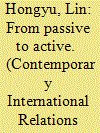

|
|
|
|
|
| Publication |
2014.
|
| Summary/Abstract |
As one of the victorious allies of World War - I, China attended the Paris Peace Conference in 1919. Toa certain extent, the conference can be regarded as the true beginning of global governance. It was followed by the establishment of the Versailles-Washington System. The first international pattern with world participation
|
|
|
|
|
|
|
|
|
|
|
|
|
|
|
|
| 17 |
ID:
134059
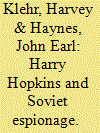

|
|
|
|
|
| Publication |
2014.
|
| Summary/Abstract |
One of the intriguing unidentified cover names in the Venona decryptions released in the mid-1990s was '19', a Soviet source senior enough to report taking part in a conversation with President Roosevelt, Prime Minister Churchill, and Vice-President Wallace at the 1943 Trident conference. While some historians thought the evidence too ambiguous to identify the real name behind '19', others built a case that it was presidential adviser Harry Hopkins. Alexander Vassiliev's notebooks, made public in 2009, resolved the issue by firmly identifying '19' as State Department official Laurence Duggan. There remain, however, writers who refuse to accept the evidence that '19' was Duggan and insist that Hopkins was a Soviet agent on the basis of insubstantial evidence.
|
|
|
|
|
|
|
|
|
|
|
|
|
|
|
|
| 18 |
ID:
133163
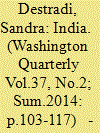

|
|
|
|
|
| Publication |
2014.
|
| Summary/Abstract |
The year 2014 will prove crucial for Afghanistan. The presidential elections will shape the country's political future, both who will govern and how much the process of democratic consolidation will have advanced. On the military front, by the end of the year, the International Security Assistance Force (ISAF) mission is expected to withdraw all combat troops from the country. While the United States and other Western countries are planning to stay engaged in Afghanistan after 2014 through the presence of training and counterterrorism forces, in late 2013 and early 2014 the difficulties in finalizing a Bilateral Security Agreement (BSA) between the United States and Afghan governments led to calls for a "zero option"-a complete departure of all foreign troops from Afghanistan by the end of 2014, leaving the country alone to manage its security, train its armed forces, and fight extremist groups.
|
|
|
|
|
|
|
|
|
|
|
|
|
|
|
|
| 19 |
ID:
133073
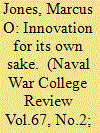

|
|
|
|
|
| Publication |
2014.
|
| Summary/Abstract |
The origins of this article lie in a new study of the Nazi German economy by Adam Tooze, a fragment of which argues that the need to overcome the technological deficit built by the Western Allies in antisubmarine warfare from 1939 triggered a major shift in U-boat design and production after 1943.1 Tooze points out that an emphasis on technological solutions to strategic and operational problems had by that point become a hallmark of the Nazis', and especially Hitler's, thinking. (Other examples were the Tiger and Panther tanks at Kursk, both of which types proved dysfunctional as platforms, and neither of which proved decisive to the outcome.) So interpreted, the Nazi penchant for imputing to innovation the means to solve a whole class of operational and strategic problems seems to resemble "technological fixes" in other fields of innovation.2 In so arguing Tooze writes off the findings of Richard Overy, who points to the failure of the regime to develop positive relationships between industry and the war effort as reflecting a "peculiar irrationality of the 'Nazi social system.'" Tooze highlights the research of Ralf Schabel on jet-engine development in the aircraft industry, research asserting that exaggerated technological expectations resulted from Germany's hopeless strategic dilemma and that the systems themselves, while quite promising, were rushed into mass production and combat without adequate testing or development. Interestingly, he then characterizes Admiral Karl Dönitz's decision to embrace the Type XXI submarine in 1943, under the technocratic direction of Albert Speer's ministry, as reflecting both the increasing unreality of German armaments propaganda and a progressively more authoritarian cast of the German war economy.
|
|
|
|
|
|
|
|
|
|
|
|
|
|
|
|
| 20 |
ID:
091401
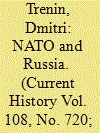

|
|
|
|
|
| Publication |
2009.
|
| Summary/Abstract |
The Western alliance has no reason to fear its members' 'defecting' to Moscow, and it has every reason to engage with the Russians on common security concerns."
|
|
|
|
|
|
|
|
|
|
|
|
|
|
|
|
|
|
|
|
|